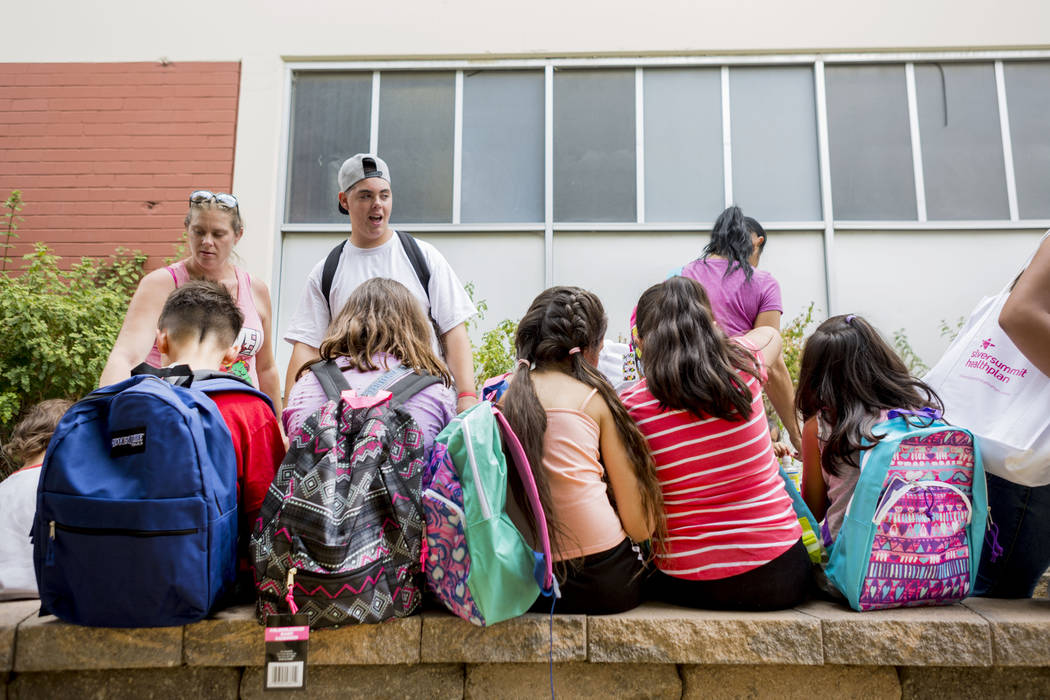Schools’ rejection of church flyers sparks backpack dispute

The days of student backpacks in Lyon County serving as a sort of community billboard might be numbered.
Though a final decision is months away, that’s the direction the Lyon County School Board appears to be heading after a Dec. 19 meeting in which it was threatened with a lawsuit by a local church whose flyers placed in schoolchildren’s backpacks were rejected because they included religious content.
District officials said eliminating this method of transmitting announcements would be the “least litigious” solution to the dispute. Lawyers for the Calvary Chapel Dayton Valley church said that in its response, the district had run “roughshod over the First Amendment.”
The flyers advertised church-run events and included references to worship music, devotion sessions, Bible studies and Christ-centered mentorship opportunities. District officials, according to emails provided by lawyers for the church, objected and wanted the terms removed before publication.
The church refused, and lawyers got involved.
The issue is one with which school districts across the country have wrestled.
But unlike Lyon County, east of Reno and Carson City in Northern Nevada, most ultimately allow religious flyers to be distributed along with those promoting secular events sponsored by groups such as the Little League or Boys & Girls Clubs, according to one expert who studies the issue.
Long-standing practice
The Lyon County district allowed the practice for decades, unregulated and generally without controversy. Flyers were submitted to schools, principals reviewed them and they were sent home along with school announcements and homework in student backpacks.
The evangelical Calvary Chapel Dayton Valley church has taken advantage of the program, sending home flyers advertising events such as youth nights, outdoor adventures and a summer lunch program, according to Jeremy Dys, deputy general counsel at the Texas-based First Liberty law firm, which is representing the church.
The trouble began in April, Dys said, when two schools refused to distribute a church flyer about upcoming events. The schools said they were following the guidance of an associate superintendent.
In July, the board officially adopted a formal policy for the service, which it called a “limited public forum.” Among other things, the policy stated that flyers that “promote a religious opinion/belief, are propagandistic or proselytizing” will not be distributed.
In the fall, the church submitted two new flyers. Changes were requested by the district that church officials said were not in line with the written policy.
The church sent a letter to the Board of Trustees in November complaining about the edits, prompting the move the next month to end the dispute by putting an end to flyer distribution.
“The LCSD Board of Trustees made the recommendation for the elimination of a limited public forum by no longer providing the public service of distributing flyers and announcements for external organizations as it appears that this has become the least litigious scenario,” district spokeswoman Erika Garcia said in an email.
That’s unfortunate for the church and other organizations in the area, Dys said.
“This is entirely unnecessary. They’d rather take their ball and go home,” he said. “They’ve decided to close this forum and to simply ignore the law. The church is very disappointed, and they’d like to be able to continue to be a good partner to the school district and intend to do so.”
The decision has to go through a public hearing and multiple votes from the board before it is final. The board meets next on Jan. 23.
Church and state
It’s well within the district’s purview to shut off the pipeline of community information, but it’s not necessarily the best path, said Charles Haynes, the founding director of the Religious Freedom Center at the Newseum Institute.
“They have every right to say no to everybody, but they are also taking a path that may be bad for their relations with the public and the parents and may not be in the best interest of their students,” said Haynes, who has consulted school districts across the country on such issues.
Most districts Haynes has worked with ultimately allow the process to continue, especially because lower courts have backed religious institutions in similar cases. Haynes does recommend that districts require disclaimers on flyers saying the event is not sponsored or endorsed by the district.
“Frankly, most of these districts, particularly rural districts, that’s what parents want,” he said.
Public schools cannot advocate for one religion over another under the establishment clause of the First Amendment to the U.S. Constitution. But Haynes said many school officials aren’t clear what that means.
“Just because the content of the activity may have religion in it or just because it comes from a religious organization, (that) does not give the school the right under the establishment clause to say we can’t do this,” he said.
Clark County has a policy similar to that of Lyon County, the district confirmed, but has not had any issues, spokeswoman Melinda Malone said. In Clark County, the principal can review and deny materials. The organization can appeal to an associate superintendent, whose decision is final.
The principal also determines when and where the materials are distributed to ensure the activity doesn’t disrupt school.
Contact Meghin Delaney at 702-383-0281 or mdelaney@reviewjournal.com. Follow @MeghinDelaney on Twitter.













